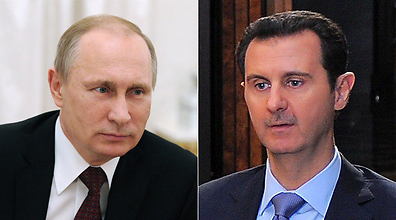Is Assad’s downfall imminent?
Friday, 19 June 2015
Raed Omari/Al Arabiya
Given the lack of international media in Syria, it is worth listening to Syrians who are still there, through their relatives in the diaspora. They say forces loyal to President Bashar al-Assad are losing the upper hand on the battlefield. I am told by many Syrians that the Free Syrian Army (FSA) is gaining ground not only in the south, as is already widely known, but across the country, including in Latakia, Assad’s stronghold.
Syrians have also spoken of an emerging harmony between the FSA and Jabhat al-Nusra and other Islamist rebel groups, and of government forces selling their posts to the opposition in Nasib on the border with Jordan and Qalamoun near Lebanon.
A union of opposition forces under a joint military command would be a game-changer. They say the regime is rapidly losing troops and resources, with barrel bombs being its only effective weapon. Even describing Assad as president garners mockery from many Syrians, who say Iranian strongman Qassem Suleimani is the real leader of Syria now.
Game-changer
However, developments on the ground also speak for themselves, with the Syrian regime – strongly backed by Iran and Hezbollah – unable to win a war that has been raging for almost five years. Assad is not firmly in control of a single complete region in Syria. The regime has repeatedly failed to take opposition-held areas, especially those on the borders with Jordan, Lebanon and Turkey. The FSA’s stronghold is in the south, but it also has a strong presence in Aleppo, Hama, Homs and Damascus. Jabhat al-Nusra is in many areas on the border with Lebanon. Raqqah, and the eastern region of Deir al-Zour and Tadmur, are reportedly the strongholds of the Islamic State of Iraq and Syria (ISIS). Northern Syria is the Kurds’ domain. The regime’s territorial control is thus not larger than the other warring parties.
Opposition forces have acquired battlefield expertise and improved their military tactics. Like Assad, they have secured sustainable supplies of resources and weapons. A union of opposition forces under a joint military command would be a game-changer. There is talk of such an attempt, with the spread of ISIS being the major driving force. Politically, the opposition seems to be in a comfortable position. Unlike before, the Western-backed Syrian National Coalition (SNC) seems to have little appetite to attend peace conferences.






















